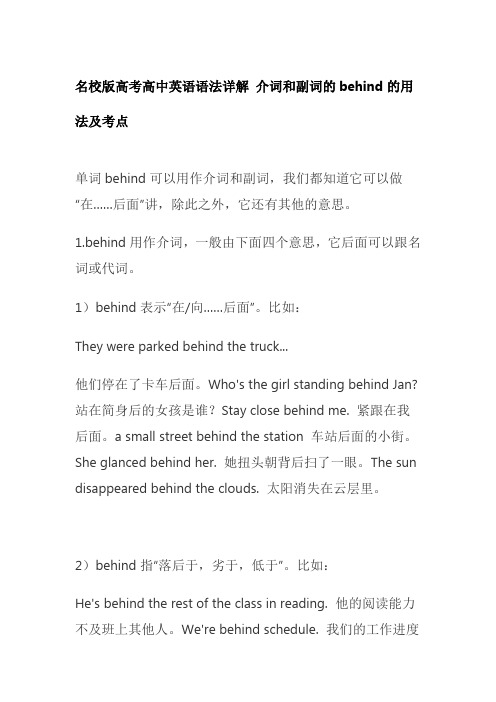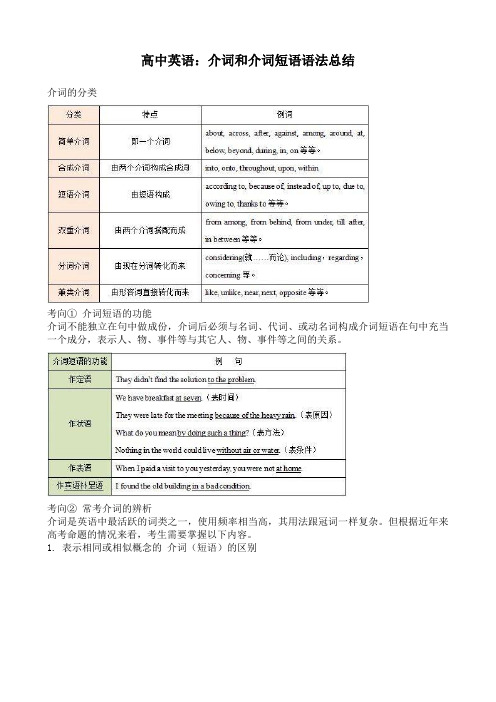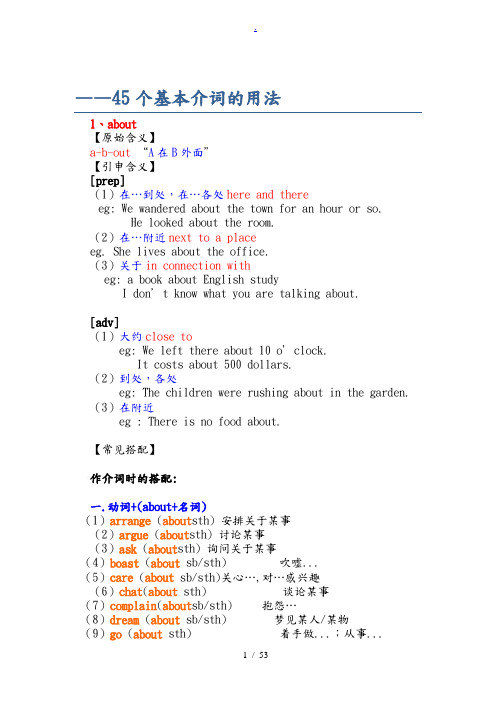高中英语介词讲义
名校版高考高中英语语法详解 介词和副词的behind的用法及考点

名校版高考高中英语语法详解介词和副词的behind的用法及考点单词behind可以用作介词和副词,我们都知道它可以做“在……后面”讲,除此之外,它还有其他的意思。
1.behind用作介词,一般由下面四个意思,它后面可以跟名词或代词。
1)behind表示“在/向……后面”。
比如:They were parked behind the truck...他们停在了卡车后面。
Who's the girl standing behind Jan? 站在简身后的女孩是谁?Stay close behind me. 紧跟在我后面。
a small street behind the station 车站后面的小街。
She glanced behind her. 她扭头朝背后扫了一眼。
The sun disappeared behind the clouds. 太阳消失在云层里。
2)behind指“落后于,劣于,低于”。
比如:He's behind the rest of the class in reading. 他的阅读能力不及班上其他人。
We're behind schedule. 我们的工作进度落后了。
The trains are running behind schedule.那几班列车已晚点了。
这里的behind常与schedule搭配使用。
3)behind指“支持,赞成,做……后盾”。
比如:She knew that, whatever she decided, her family was right behind her. 她知道,无论她做出什么决定,她的家人肯定会支持她的。
We are behind you all the way!我们自始至终支持你!4)behind指“对…来说成为过去;抛到…的脑后”。
比如:She put the nightmare behind her.她已将噩梦抛诸脑后。
2021年新课标新高考英语复习练习讲义:专题二十 介词和代词

专题二十介词和代词【考点集训】一、单句填空题组一介词1.While staying in the village,James unselfishly shared whatever he had with the villagers without asking for anything return.答案in2.Facing up to your problems instead running away from them is the best approach to working things out.答案of3.The Scottish girl blue eyes won the first prize in the Fifth Chinese Speech Contest.答案with4.It is unbelievable that Mr.Lucas leads a simple life his great wealth.答案despite5.Is this your necklace,Mary?I came it when I was cleaning the bathroom this morning.答案across6.My parents and teachers were surprised my bad performance.答案at7.On Saturday morning,they decided to climb the mountain by themselves while their parents relaxed at the campsite.After three hours,they reached the top no problems.答案with8.Ocean currents changed the climate and probably led the fish into different areas.答案with9.I'm writing to apply the position as a volunteer.答案for10.But the success of Sisyphe Bookstore,one of the biggest privately-owned bookstore chains in China,may serve a great example.答案as11.This led the sudden and tremendous growth of its up-and-coming industries.答案to12.Also,stay focused your work.答案on题组二代词1.In the deaf culture of North America,many listeners show applause not by clapping their hands but by waving in the air.答案them2.Dating sites also make easy to avoid someone who you are not interested in.答案it3.At that moment an attractive young lady who noticed my book came up to me and introduced(her).答案herself4.—Who's that at the door?—is the milkman.答案It5.Susan made clear to me that she wished to make a new life for herself.答案it6.A smile costs ,but gives much.答案nothing/little7.In some countries,people eat with chopsticks,while in ,knives and forks.答案others8.She'd lived in London and Manchester,but she liked and moved to Cambridge. 答案neither二、写作微练(一)翻译下面的句子,注意介词和代词的使用。
高中英语专题讲解——-连词和介词

连词和介词★高考考试双向细目表★★高考考查导向★并列连词★教学起点★高考趋式高考试题常设置特定语境考查热点介词和连词与介词的固定搭配及其变形。
连词不能在句子里独立地担当句子成分、而只能起连接作用,连接词与词,短语与短语、句子与句子。
★互动研学★并列连词1.表示转折关系的并列连词有but,yet,still,while,when (然而,偏偏)等。
例1:The car is very old but it runs very fast.这辆小汽车虽然很旧了,但跑得很快。
例2:The winter in Beijing is very cold while that of Kunming is warm.北京的冬天很冷,然而昆明的冬天却很暖和。
例3:Why did you borrow the book when you had one?这本书你有一本,为什么偏偏还借呢?例4:The problem was a little hard, yet I was able to work it out.这道题有点难,然而我却把它做出来了。
例5:I explained twice, still he couldn't understand.我解释了两遍,然而他却还不懂。
注意:while在表示转折关系时,往往连接内容和结构对称的句子。
I love strong tea while my father loves coffee.我喜欢浓茶,然而我爸爸却喜欢咖啡。
2. 表示选择关系的并列连词有or, or else, either…,or…,neither…nor…,otherwise 等。
例1:Would you like to leave or would you like to stay? 你是想走呢还是想留?例2:Do you go to school by bus or on foot? 你上学是坐公共汽车还是走着去?例3:You can come either on Saturday or on Sunday.你可以星期六来也可以星期天来。
英语高中语法介词的用法和常用介词的区别

英语高中语法介词的用法和常用介词的区别高中英语语法:介词的5种用法1. 时间1)at表示在某一时间点: at 3 o’clock2)in表示在某一时间段内的某一或某些点: in 2004in表示在某段时间的结束点:I’ll see you again in a week.3) during表示某一时间段内自始至终:during the first period4) on表示在某一day/date或其中的某一段:on Monday, on Sunday morning5) by表示不迟于某个时间:by now2. 地点1)at表示在某处(而非它处):at school2) in表示在内部或某个范围内:in the office3) on表示在上面与某平面接触:on the table4) outside表示在某个范围之外:outside world5) under表示在比某个位置低的地方或在某表面之下:under a chair6) by表示靠近或接近:by the window3. 原因1)because of表示因为或以…为理由:because of my father2) for表示动作或活动的目的、目标或意图:for sale3) out of表示起源、来源或原因:out of duty4. 方式1)with表示以…方式:with skill2)in表示以某种方式: in French, in cash, in this way5. 方法1) by表示方法、手段: by the back road, by bus, by working hard2) on表示运送方式:on a train, on foot3) in表示途径或材料:in oils高中英语语法中常用介词的区别1、 at、in、on:如:常用词组有: at noon, at night表示时间的 at, in, on:at 表示片刻的时间,at 8 o’clock,at midnight, at the end of, at that time, at the beginning of, at the age of, at Christmas, at New Year 等。
高中英语:介词和介词短语语法总结

高中英语:介词和介词短语语法总结介词的分类考向①介词短语的功能介词不能独立在句中做成份,介词后必须与名词、代词、或动名词构成介词短语在句中充当一个成分,表示人、物、事件等与其它人、物、事件等之间的关系。
考向②常考介词的辨析介词是英语中最活跃的词类之一,使用频率相当高,其用法跟冠词一样复杂。
但根据近年来高考命题的情况来看,考生需要掌握以下内容。
1.表示相同或相似概念的介词(短语)的区别2.常见同一形容词与不同介词搭配时意义上的差别3.容易混淆的含有介词固定搭配的词组【难点释疑】一、常用介词辨异1. about,on,of 关于①on多用于慎重的、正式的语言交际场合。
常见于"学术上"的"论文"或"演说"等题目,可供专门研究这一问题的人阅读,有"论及"之意。
②about表示的内容多为普遍、不那么正式,有"述及"之意。
③of作"关于"讲,表示提及、涉及某人(事)时,只表示事情存在或发生,并不涉及详情;有时与about意义相近,但有时意义很不同,常与动词know、hear、learn(听说)、speak、talk、think、tell等连用。
2. except,except for,except that,but,besides,beside①except"除……之外",指不包括……,后面常接名词、代词(人称代词常用宾格),还可接介词短语、副词和动词不定式,此时相当于but,但不定式常不带to。
②except for"除了,只有",意思和except一样,主要指说明基本情况后,而在细节上加以修正,后面常接名词性短语。
③except that"除了,只是",意思和except、except for一样。
但在用法上,其后常接名词性从句,也可接when、where等词引导的其他从句。
④but所含"除……外"的意思不如except明确。
but多用在代词(主要是不定代词、否定代词和疑问代词)之后。
⑤besides表示"除……外还有",所排除的事物常包括在所述范围之内。
高中英语45个介词的基本用法

——45个基本介词的用法1、about【原始含义】a-b-out “A在B外面”【引申含义】[prep](1)在…到处,在…各处here and thereeg: We wandered about the town for an hour or so.He looked about the room.(2)在…附近next to a placeeg. She lives about the office.(3)关于in connection witheg: a book about English studyI don’t know what you are talking about.[adv](1)大约close toeg: We left there about 10 o’clock.It costs about 500 dollars.(2)到处,各处eg: The children were rushing about in the garden.(3)在附近eg : There is no food about.【常见搭配】作介词时的搭配:一.动词+(about+名词)(1)arrange (about sth) 安排关于某事(2)argue (about sth) 讨论某事(3)ask (about sth) 询问关于某事(4)boast (about sb/sth) 吹嘘...(5)care (about sb/sth)关心…,对…感兴趣(6)chat(about sth) 谈论某事(7)complain(about sb/sth) 抱怨…(8)dream (about sb/sth) 梦见某人/某物(9)go (about sth) 着手做...;从事...(10)hear (about sth) 听说...(11)know(about sth) 了解...(12)learn (about sth) 得知某事(13)put (about sth)散布(谣言等)(14)quarrel (about sth) 为...争吵(15)see (about sth) 负责处理...(16)talk(about sth) 谈论...(17)think (about sth) 考虑..(18)warn sb (about sth) 告诫某人关于某事(19)wonder(about sb/sth) 对.. 好奇(20)worry(about sb/sth) 对...担心二、名词+(about+名词)(1)concern (about sb/sth)对…的关心/关怀(2)curiosity (about sb/sth) 对…的好奇(3)doubt (about sb/sth)对…的怀疑(4)ethusiasm (about sth) 对…的热情(5)information (about sb/sth) 关于…的信息(6)remark (about sth) 对…的评论(7)opinion (about sth)对…的意见(8)view (about sb/sth) 对...的观点三、be+adj+(about+名词)(1)be angry(about sth)为…而生气(2)be anxious(about sth)为…忧虑(3)be careful(about sth)当心…(4)be cautious (about sth) 谨防...;对...持谨慎态度(5)be certain(about sth)确信关于某事(6)be curious (about sth)对…感到好奇(7)be disappointed(about sth)对…感到失望(8)be excited(about sth)对…感到兴奋(9)be glad/happy(about sth)对…感到高兴(10)be hopeful(about sth)对…抱有希望(11)be crazy/mad/wild(about sth)对…痴狂;酷爱某事(12)be nervous(about sth)为…感到不安/因...感到紧(13)be optimistic/positive (about sth)对...是积极乐观的(14)be particular (about sb/sth) 对... 讲究,挑剔(15)be sad(about sth)为…而难过(16)be serious(about sth)对…认真(17)be sorry (about sth) 对...抱歉作副词时的搭配:名词+动词+about(1)sth come about某事发生(2)sth getabout某事(尤指消息等)传开(3)sb turn about某人转身(4)sb wanderabout某人徘徊,游荡(5)sb walk about某人走来走去2、above【原始含义】a-b-over“A在B上方”【引申含义】prep.(1)在…上方at or to a higher place than sth/sbeg: The sun rose above the horizon.(2)数目大于…/重量超过…/价格(能力、地位)高于…more than sth.; greater in number,levelor age thansb./sth.eg: There is nothing in the store above 50 cents.(3)重要性或质量超过、胜过of greater importance or of higher quality than sb/stheg. I rate her above most other players of her age.(4)声音超过…louder or clearer than another soundeg: I couldn’t hear her above the noise of the traffic.(5)不至于,不屑于做某事too good or too honest to do stheg. She is above suspicion.【常见搭配】一、动词+(above+名词)(1)live ( above one’s income) 入不敷出地生活(2)put A(above B)把A看得比B更重要(3)rise (above sth) 克服...,不受....的影响(4)talk (above one’s head) 高深莫测地谈论二、be+(above+名词)(1)be(aboveoneself)兴高采烈= be in one’s high spirit(2)be (above one’s head)难以理解/超出某人理解能力3、across【原始含义】a-grass“一片草坪”,across指在平面上经过,就像人走过一片草坪那样。
高中英语高考语法专题:介词
in
表示在某段较长的时间内(如 世纪、年代、月份等)或泛指
上午、下午、晚上等
in December“在十二月”; in the morning“在上午”
(2)表示时间的 in 和 after
in after
意义
表示“在……时间之内/ 之后”,所在的句中必
须表示将来。
表示“在……时间之 后”,通常“after+时 间段”与过去时连用, “after+时间点”与将
He rowed me over to the other side of the lake.
Cover her over with a blanket.(adv.)
(4)against有“违背,违逆;反对;对……不利;倚;靠;碰撞; 预防;衬托;与…相比”之意。
Vacations help us perform better at work, improve our sleep quality and cushion us against depression.假期能帮助我们在工作中表现得 更好,提高我们的睡眠质量和缓解忧愁。
My father will be back after 3 o’clock.
My father came back here after 3 days/ 3 days after/ 3 days later.
(2) 当时间名词前面被 this, that, last, next, some, every, one…等词限定时,通常不用任何介词。
(3) For + 时间段,用与表示一个动作或行为状态 持续了多久。(并不一定用完成时)
(4) 时间段+ ago/ before
through across over
高中英语定语从句关系副词及介词关系代词语法专讲
定语从句语法专讲(关系副词&介词+关系代词)★When引导的定语从句修饰表示时间的名词,并在定语从句中作时间状语,相当于“介词on/in/at/during等+which”。
1.July is the month. In this month we have a lot of rain.July is the month when we have a lot of rain. (when= in which)2.There was a time. During that time there were no radios, telephones or TV sets here. There was a time when there were no radios, telephones or TV here. (when= during which)3. I was born on Oct.1st ___ when/ on which_ our nation was set up.4. We still remembered the days __ when___ /____ in which____we travelled together.注:若定语从句的先行词是时间,但定语从句缺主语或宾语,则用which或that引导定语从句。
1.I’ll never forget the time that / which I spent on campus.2.I’ll never forget the time that/ which was spent with you.★where引导的定语从句修饰表示地点的名词,并在定语从句中作地点状语,相当于“介词(on/in/at/from等)+ 关系代词(which)”。
1.The school is a key school in Hebei Province. His sister works at the school.The school where his sister works is a key school in Hebei Province.(where= at which)2.Have you ever been to the house? Lu Xun once lived in that house.Have you ever been to the house where Lu Xun once lived?(where= in which)3.I lost my wallet in the restaurant where we had lunch.注:1. 如果定语从句分别修饰point, situation, stage, condition和case等表示抽象意义的词,常用where 引导,意思是“到了某种地步,在某种境况中”。
高中英语高考介词用法总结(基本用法+具体用法)
高考英语介词用法总结一、基本用法①介词短语用作形容词时通常置于名词后。
She loves the ring in the shop.她喜欢商场里的那枚戒指。
The lady from the U.S.loves spicy food.从美国来的那位女士很喜欢吃辣。
②介词短语用作副词时,可以灵活地放在句子前后。
We are going to the market.我们在去市场的路上。
---to the market是动词go的副词。
In that case you should go see a doctor.如果那样的话,你去医院看看吧。
---in the case用作修饰句子后半部分内容的副词。
③介词加名词由于介词后一定要接名词,所以如果要用动词的话,应将动词转换为动名词。
She’s not interested in the news.她对这则新闻没兴趣。
I'm so sorry for keeping you waiting.让你久等了,真是对不起。
④介词加宾语介词后加代名词时,应将主格转换为宾格。
I’m fond of him.我很喜欢他。
He's not into her.他不喜欢她。
1)Please, take care of him.请好好照顾他。
2)I'm sorry for being late.很抱歉,我迟到了。
3)Jack is used to working late, but Linda isn’t.杰克习惯工作到很晚,但琳达还不适应。
4)Because of them, the team lost the game.因为他们,所以输了这场比赛。
5)My father depends on me so much.我爸爸太依赖我了。
二、具体用法1.介词in①在...空间里或者是场所in a room 在房间里in the bank 在银行in the hot tub 在热水的浴缸里in the ocean 在海洋里in the sky 在天上in the air 在空中②在城市、国家等相对来说范围较大的场所in the Korean peninsula 在朝鲜半岛in the universe 在宇宙之中in the country 在乡村in the city 在城市里in Seoul 在首尔in Europe 在欧洲③年、月、季节等相对较长的时间in 2002 in the 1980sin March in springin winter in the 20th century④指早上、下午、晚上in the morning 在早上in the afternoon 在下午in the evening 在晚上对比: at noon 中午 at night 晚上⑤表示期间How could you finish he work in 3 days?这件事怎么可能在三天内完成?We can’t get to the island in 5 hours?我们不可能在五个小时之内到那个岛的。
高中英语中常见的介词用法总结
高中英语中常见的介词用法总结1. in:表示在某个范围、实体或地点之内。
例如:in the park(在公园里)、in the morning(在早晨)。
in:表示在某个范围、实体或地点之内。
例如:in the park(在公园里)、in the morning (在早晨)。
2. on:表示在某个表面、时间或日子之上。
例如:on the table (在桌子上)、on Monday(在星期一)。
on:表示在某个表面、时间或日子之上。
例如:on the table(在桌子上)、on Monday(在星期一)。
3. at:表示在某个地点、时间或状态。
例如:at the cinema(在电影院)、at 9 o'clock(在9点钟)。
at:表示在某个地点、时间或状态。
例如:at the cinema(在电影院)、at 9 o'clock(在9点钟)。
4. by:表示通过某种交通方式、靠近某个地点或借助某人之类。
例如:by bus(乘公交车)、by the river(在河边)。
by:表示通过某种交通方式、靠近某个地点或借助某人之类。
例如:by bus(乘公交车)、by the river(在河边)。
5. to:表示方向、目标或接触某物。
例如:go to school(去学校)、give it to me(给我)。
to:表示方向、目标或接触某物。
例如:go to school(去学校)、give it to me(给我)。
7. with:表示陪伴、带有某种特征或使用某物。
例如:play with friends(和朋友一起玩)、a book with a red cover(一本封面是红色的书)。
with:表示陪伴、带有某种特征或使用某物。
例如:play with friends(和朋友一起玩)、a book with a red cover(一本封面是红色的书)。
8. for:表示目的、目标或所属关系。
- 1、下载文档前请自行甄别文档内容的完整性,平台不提供额外的编辑、内容补充、找答案等附加服务。
- 2、"仅部分预览"的文档,不可在线预览部分如存在完整性等问题,可反馈申请退款(可完整预览的文档不适用该条件!)。
- 3、如文档侵犯您的权益,请联系客服反馈,我们会尽快为您处理(人工客服工作时间:9:00-18:30)。
1 高中英语语法——介词 一.常见高频介词的用法: 1.against (1.)表示方位:“逆;靠着,倚靠;碰着,撞击” Birds fly slowly__________ the wind. Tired, Jim was fast asleep with his back _____________ a big tree. He often stands___________ the fence and talks endlessly with my father about gardening. The girl was leaning ___________ the wall with her arms folded. (2.)表示态度:“反对;对着;违背” They got married____________her parents’ wishes. Scientists are racing_____________ time in order to find a cure for cancer as soon as possible. The invention of artifical hearts marked a turning point in the battle___________ heart disease. An agreement seems to be impossible because the majority of the committee members are ____________ it. (3.)表示对比:“以……为背景;衬托,相应”: The skier’s red clothes stood out clearly __________the snow. Before selecting the curtain for your newly-decorated house, it’s more important to know what colors look great___________ the wall paper. Flowers look better___________ green leaves. (4.)“防备;对抗”: We will be competing __________ the best companies in Europe. Some animals store food___________ the winter. They don’t believe its goal is to defend____________ possible missile attacks from rogue countries.
2.as (1.)“作为;当作” I feel that one of my duties__________ a teacher is to help the students to become better learners. New York City, also known___________Big Apple, becomes one of the world’s great business and cultural centers. __________ an eight-year-old boy, I spent most of that afternoon sitting in the shade while they sweated in the sunshine. (2.)习惯用语:as for; as to至于;关于 _________ for me, I don’t mind going there by train. _________ for the selection of business media, would you like to share some thoughts with us?
3.at (1.)表示“处于...状态” Europe was_________peace for the first time in ten years after the wars. After a rather hard time, people could 2
live________ at last. (注意:in peace“平静地、安静地”=peacefully; at peace处于和平状态) The two countries are _________ war. (2.)表示“在...时刻、钟点、岁” Children begin schooling___________ the age of five. The two brothers decided to leave _________ midnight, for they had many miles to cover. The advertisement said that a suitable house in a quiet area was up for sale___________ a reasonable price (3.)表示速度、价格、比率:“以...” The population of the world is growing_________ a surprising rate. Gary must have driven_________ the speed of 80 miles an hour just now, for which he was given a ticket by a policeman. (4.)表示目标、方向:“对、向、朝”,这类动词有:laugh, come, aim, point He aimed_______ the target. I stared __________everything as if I were looking for the first time. My uncles immediately jumped up and shot their arrows ________ the bird. (5.)表示“应...请求、号召、邀请” We came to Beijing_________ the invitation of my good friend who has been woeking here for three years. (6.)习惯用语:“at+名词短语”:表示“一...就...” at the sight of...一看见...就... at the sound of...一听到...就... at the thought/ ideaof...一想起...就... at the news of ...一得到...的消息,就... The girl cried _________ the sight of her mother. The terrible king’s wish was that all the people would shake in fear_________ the sound of his order. People in love with each other may feel empty and sick___________ the thought of not being together.
4.beyond (1.)表示程度:“超出,非……所能及” To be acknowledged as the first to receive this honor is_____________ expression in words for me. You really need to pay a visit to Shanghai since you haven’t been there for years, and you will find changes there are_____________ imagination. We must read not only between the lines, but sometimes__________ the lines so that we can fully understand the writer. (2.)表示时间:“过了,比...晚,迟于……” He delayed the matter ________ the fixed time. He came home__________ the usual time. (3.)表示位置:“在……另一边,在……更远处” The woods go for about two miles ___________ the river. 这片森林伸展到河那边大约两英里。 The small villiage is 20 miles_________ the town. 那个小村庄在离城20英里以外的地方。 3
5.by (1.)表示方法、手段:“靠、用、通过” You can reserve tickets __________ phone. 你可以通过电话订票。 He makes a living_________ selling newspapers. This kind of work is done_______hand/machine. 这种工作是手工/机器做的。 ——What do you mean __________saying “the boy is overgrowing?” ——I mean that he is tall_______ his age. (2.)表示标准、度量、数量:根据,按照,以……计算,常用结构“by+the+计量名词或by+un.(weight/length/width/depth/volume)” Parcel post is charged _________ weight and mileage, without reference to contents.包裹邮递按重量和路程收费,不管所装何物。 Meat is sold________ the pound. They are paid_________ the hour. (3.)“经过、经由” If you really have to leave during the meeting, you’d better leave___________ the back door. He walked right _________ me without even saying hello.他径直从我身边走过,甚至连招呼都不打。 (4.)表示时间:“在...之前,不迟于” It will be dark_________ the time I get there. The documents need to be ready_________ next Friday. Workers will have finished the construction of the main teaching buildings_________ the end of this month. (5.)表示方位:“在...旁边,靠近”(同beside) He’s wandering, standing__________ the window as if something urgent occurred. The little girl is so timid that she always sit__________ her mother wherever they go.
